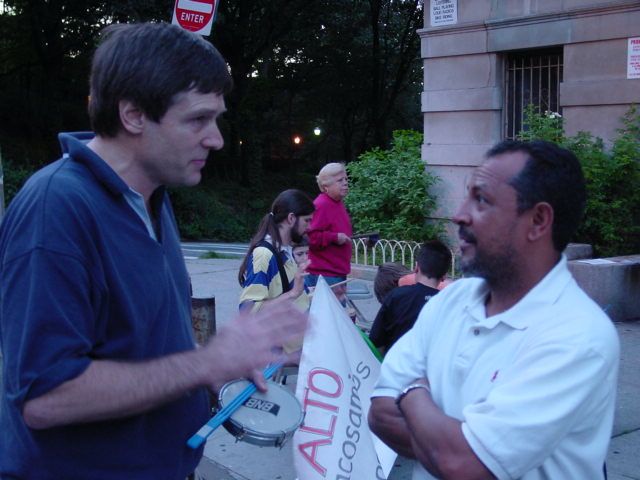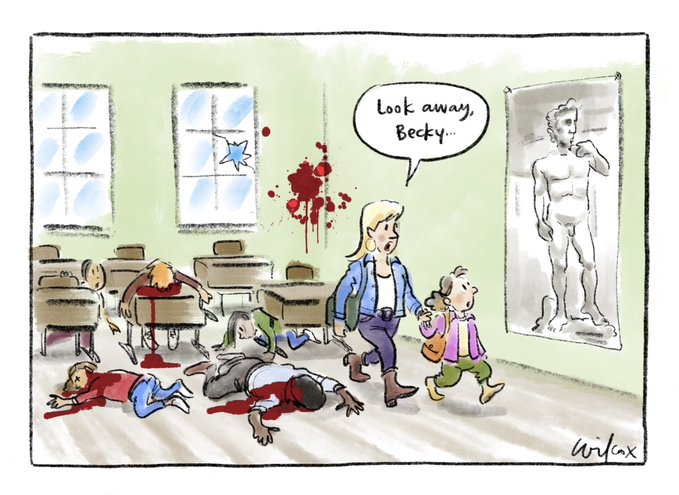Rad twitterers stuck on gestural politics have missed what might turn out to be a watershed moment in the history of America’s class struggles. While nobody with any sense is proclaiming a New Millennium for this country’s workers, there may be a new conjuncture around the corner. Thanks to the UAW, as well as Teamsters at UPS, who have won the largest victories for American labor in a half-century. It’s imperative that would-be leftists NOTICE what’s happened in factories and warehouse (and delivery trucks). With a little help from Labor Wave radio, you can listen below to an interview with historian (and former UAW staff organizer) Erik Baker, who has addressed the UAW’s recent wins in Jewish Currents, “Revaluing the Strike.”
 Various Authors
Various Authors
“We are sweet since we are born”
Six Miles Out isn’t La Terra Trema, but this short film about fishermen gently brings home the truth talked up by its Palestinian sponsors: “we are not numbers.”
Click on “Read more” for a bigger screen…
Hatikvah
Yuval Noah Harari has been on tv and the web often since Oct. 7th. He sometimes seems too smooth for this moment. (He’s come across as glib to more than one sharp observer.) Yet and still, I hope he’s a voice for the “saner softer polities” that Hardy once invoked way way back at the beginning of the 20th C. Harari has allowed in his brief talk below that most Israelis and Palestinians are too immersed in their own pain right now to care about the suffering of anyone outside their own tribes, but “outsiders” have no excuses: “Don’t be intellectually lazy. Don’t be emotionally lazy. Don’t just see part of this terrible reality…Keep a space for future peace, because we can’t keep that space now…”
Here’s Harari’s recent essay in The Guardian.
laughter makes you smarter (redux with Phil Greene & Robert Hunter)
Your editor realized it was dumb not to have put the vid of these Kenyan kids up top when I posted Charlie Keil’s poem (which they helped spark) so…
ted talks this morning one on laughter makes you smarter
another by 93-year old fitness freak got a few yucks
then I went to Drum & Dance Kenyan Children**
Use Him
In February 2023, music producer Ian Brennan traveled to Mississippi to record with the prisoners of the notorious Parchman Prison, which has a rich musical history. (Former inmates include Son House, Bukka White, Mose Allison and Elvis Presley’s father, Vernon Presley.) The bureaucratic process behind Brennan’s visit took over three years: “Granted approval a little more than a week before, Brennan caught a red eye flight to be there on a Sunday morning for the few hours he was allowed to record.” Parchment Prison Prayer belongs to the honorable tradition of song-catchers searching for unchained melodies in penitentiaries. This time around, Brennan may have caught at least one song for the ages…
“I give myself away,” sings the vocalist to his personal Jesus (as he makes the piano chime), “so you can use me.” That’s the gospel truth. The singer/pianist is the only Parchman prisoner/performer recorded by Brennan who chose to remain anonymous.
Danny Lyon, Journey West
This short film was made on the occasion of this summer’s ABQ Museum show, Danny Lyon – Journey West.
Loss is More (Ali Siddiq’s Latest)
Ali Siddiq does some of the best acting I’ve ever seen in his new standup show. The whole thing is full of felt WTF’s that have made him America’s reigning ghetto existentialist. Like post-accident Richard Pryor, Siddiq consigns comedy to the ashes when he relives the loss of his half-sister, Ashley Rae Mitchell, who died when she was eight years old. Per Siddiq, her exit had a killer upshot: “I’m so dead inside I’m a fucking monster in the streets.” Siddiq isn’t being slick. He’s not out to excuse his own crimes even as he makes art out of collateral damage.
You can cut to the “chapter” where Siddiq recalls the death of his baby sister below (beneath the video of his whole show).
Ren & Band
“Hi Ren,” per Scott McLemee above, might be the best intro to the range of talents that’s made virtuoso Ren a trauma-stomper for his own gen and plenty of elders. (McLemee also twigs to Ren’s rap.) Right now, though, I prefer hearing our Rennaisance boy-prodigy play with Big Push, the band he’s busked with in recent years. Their live performances are shot through with plain joy in musicking. When they do “Paint it Black” or “Johnny B. Goode” or “Guns at Brixton,” I flash back to mid-60s battles of bands. Ren and Big Push haven’t covered “Gloria“ yet but I’m sure it’s in their future…
A couple videos of Ren and friends pushing the feeling:
Nation Time
In his novel To Asmara, Thomas Keneally — the author best known for Schindler’s List — offered a compelling portrait of Eritrean caregivers amid an agonizing armed struggle for independence. I flashed on his fiction as I watched the short film (below) made by Times reporters embedded in a Ukrainian medical unit close to the front lines. The film is less romantic than To Asmara. Unlike the Eritrean heroes of Keneally’s novel, the Ukrainian doctors are not paragons. When they must care for a Russian prisoner of war, they do the job but…well, you’ll see. For now, let’s just stipulate the Ukrainians are not saints like Keneally’s fighters and healers. (Or, saying it another way that might speak to longtime First readers, there’s nobody like Fr. Frechette in this unit.)
Labor History Happening Now
Your editor forwarded on the following passages from an informative piece by Michael Tomasky to First‘s…labor caucus:
Nobody seems to have noticed this, but over the course of the spring, the country’s four leading freight rail carriers agreed to grant the vast majority of their workers paid sick days.
Everybody remembers what happened last December. The workers threatened to strike over such days, among other issues. President Biden, generally very friendly toward labor, made it illegal for the workers to strike. He was criticized by unions and workers and fellow Democrats and liberal media outlets, this one included.
None of that criticism was wrong at the time. But it wasn’t the end of the story.
“Structuring Participation”: Class Matters Podcast with Jane McAlevey
Forget Succession. If you want drama (and spicy talk), listen in to the latest Class Matters podcast. Episode 12 (link below) features Jane McAlevey who is prompted by Katherine Isaac, Gordon Lafer, and Adolph Reed Jr. to explain (1) how the work of organizing jumps off in earnest AFTER a union wins a certification election. (Getting to a first union contract is hard.) (2) how the health of any union depends on constant engagement with workers as a collective body, not as atomized figures in one-on-one grievance proceedings (3) how real democracy in a union or anywhere rests on “structuring participation.”
Dialectical Imagination (Prerequisite)
Tom Conway, President of the United Steelworkers, and Rabbits, a 21st C. Wobbly from Northumbria, offer incongruous angles on labor struggles in the American South and the UK.
“Love…Thy Will Be Done” (& Jody is a Preacher)
C. Liegh McIness commended a lovely track by Prince that wasn’t released until after his death, Baby You’re a Trip, and that, in turn, led your editor to another amazement on Prince’s posthumous Originals collection. A version of this song, with the Cuban American pop singer, Martika, doing the vocal, was a hit in Australia. Here’s Prince’s version…
“Come and See” (with English Subtitles)
CLICK ON LINK BELOW FOR FULL MOVIE FREE ON YOUTUBE WITH ENGLISH SUBTITLES (TRAILER BELOW THE LINK)
Come and See | WAR FILM | FULL MOVIE – YouTube
Nobody Knows His Name: A Note on Adam Scheffler’s “Heartworm” (& “Googling Myself”)
“Piss expressively.”
The onomatopoeic first line of Adam Scheffler’s poem, “Advice From a Dog,” hints at his virtuosity and his modesty. This guy ain’t too proud to pet and be petted. Another one of his openers make you wonder if he’s about to give himself too much credit: “She said my butt was a piece of art…” Not to worry:
…my greatest asset, if
you will, although come to think of
it she didn’t say it was good art
only a “piece” of it, as if it’s
not complete without her hands
on it…
Scheffler is careful about intimacies. I doubt he’ll ever go Lowell. There won’t be lines from a begging (or pegging) partner’s correspondence in his poems. Nor does this nice Jewish boy suffer from Maileria. He’s no wannabe macho.
Standards (& Stadiums)
Stanley Corngold’s evocation of his first time in Yankee Stadium reminded your editor of a Q&A with another Brooklyn boy (and friend of First). When the late Jules Chametzky was in hospice last year his son, Rob, asked him if he’d ever seen Willie Mays play when Mays was in the minor leagues. Rob recalled their exchange at his father’s Memorial…
Remember Clemente (Martín Espada and Richard Torres)
December 31, 2022 marked the 50th anniversary of Roberto Clemente’s death.

